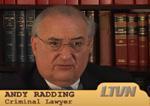"Nolle Prosequi"
BYRON WARNKEN: You'll get arrested, or there has been a complaint filed by another citizen that your conduct was criminal and it goes through the process and eventually it lands on the desk of a prosecutor. And the prosecutor is going to look out and the prosecutor decides there is not much here. The prosecutor may well dismiss it.
ANDY RADDING: That judgment making ability that discretion is a very very strong powerful tool for the prosecutor.
BYRON WARNKEN: We use fancy Latin terms in the law because of the system we came from. We say null pros, which really means "nolle prosequi", which is nothing more than a dismissal of the charges.
ANDY RADDING: The prosecutor in a given case has the discretion to decide whether that case should go forward.
BYRON WARNKEN: The prosecutor has the power to decide what charges to bring, what charges not to bring.
ANDY RADDING: He looks at the evidence. He looks at the potential defendants, the participants, the victims, the circumstances, and he makes a judgment on whether the case should go forward.
BYRON WARNKEN: As long as the prosecutor is not making that decision based on your race, your gender, your ethnicity, and your religion, a prosecutor can do anything he or she wants.
Nolle-What? Can You Translate that One for Me?
Nolle prosequi, or a "nol pros," is a Latin legal phrase meaning "to be unwilling to follow through" or, more simply, "unwilling to pursue." That may not mean a lot to you, but if you're ever charged with a crime, it means everything. When a prosecutor uses the term, she is dismissing the charge against you.
When Do I Have a Right to a "Nol Pros"?
Well, you don't actually have a "right" to a nol pros. The prosecutor has wide latitude in the criminal justice system to decide to pursue the charges against you, or to drop some or all of them.
Courts rarely question the prosecutor's decision to pursue or to dismiss a charge. In some cases, the government will "nol pros" your case if the prosecutor thinks the evidence is shaky, key witnesses can't be found, or that a trial wouldn't be in the public interest for some reason.
Thus, in a very real sense, your first "judge" is the prosecutor: A person with almost absolute power to decide whether you'll be tried.


